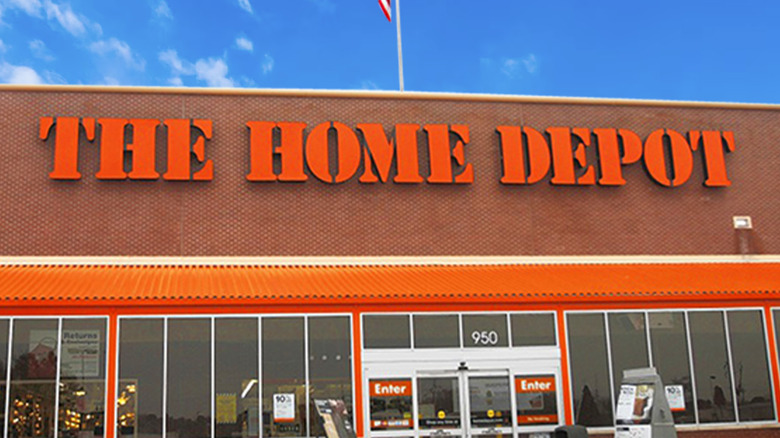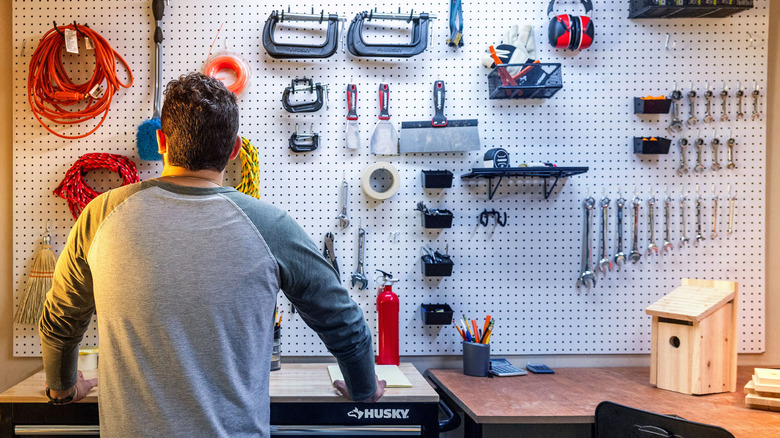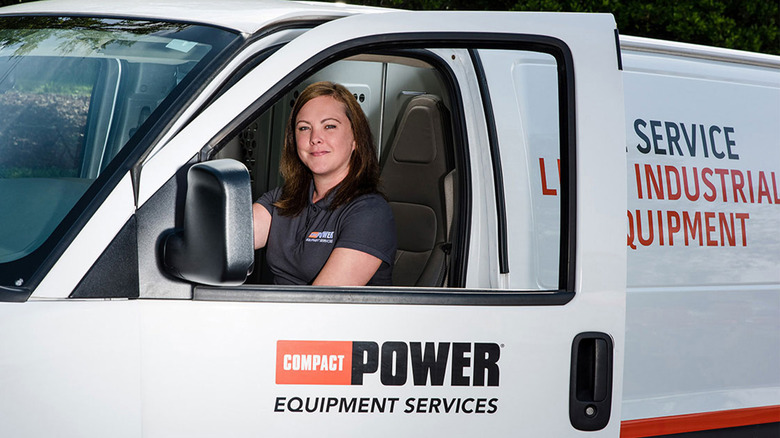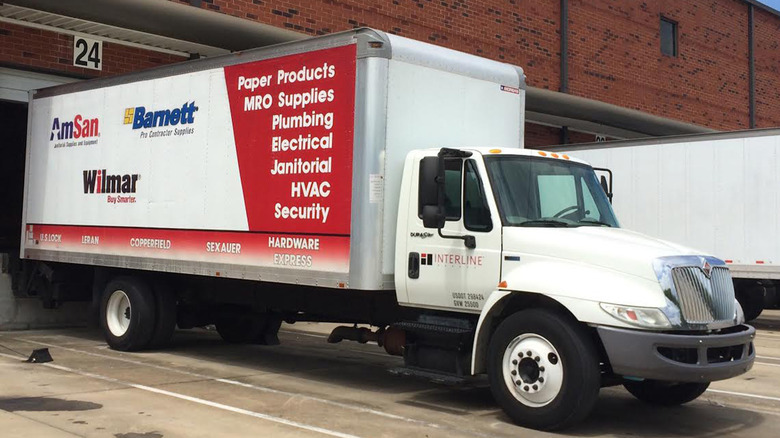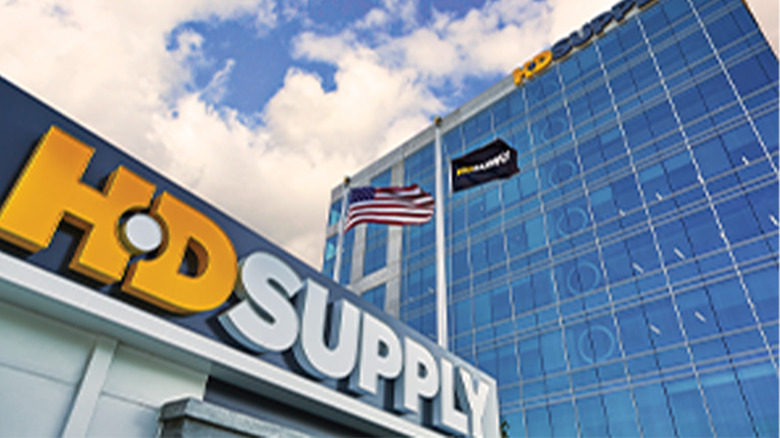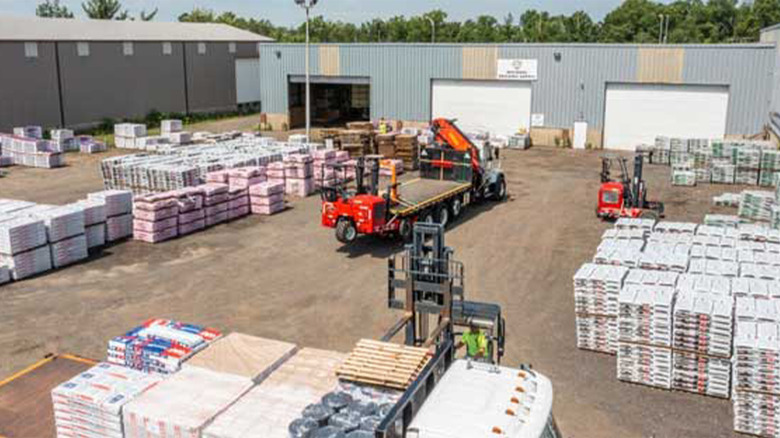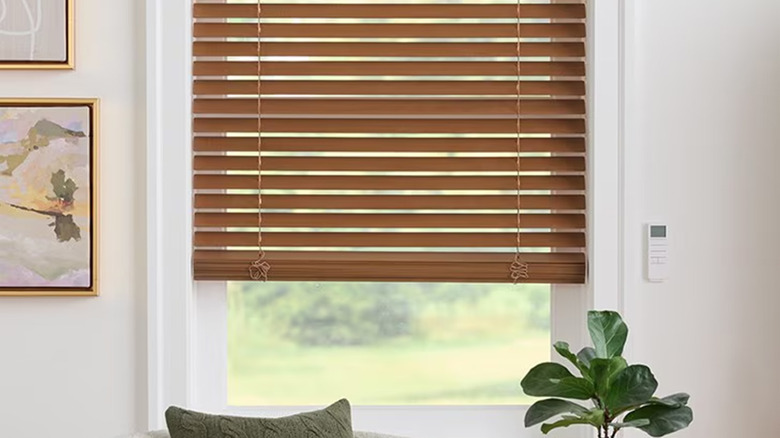8 Tool & Supply Brands Owned By Home Depot
We may receive a commission on purchases made from links.
The Home Depot is a giant in the home improvement sector of the retail industry. In fact, they are the largest company in the space, and it's not particularly close. Home Depot has almost three times the market value of its second-place competitor, Lowe's, with an extra thousand stores to boot and nearly double the operating revenue. A lot of that is selling tons of power tools from every brand imaginable, but a lot of it also comes from the various services and other contract services that Home Depot provides.
All of these things didn't pop up overnight. Home Depot has spent decades increasing its footprint through clever acquisitions and business deals that have helped it gain position and market share. For example, in 1994, Home Depot purchased Aikenhead's, a chain of hardware stores in Canada, which were converted to Home Depot stores to help Home Depot make its way into Canada faster and easier. These acquisitions and deals have led to Home Depot owning many businesses that supply parts and tools to DIY homeowners and businesses alike.
The question becomes, what were these companies and what did Home Depot stand to gain by acquiring them? Those are the questions we'll answer below. Before we begin, we'll note that Home Depot doesn't own RIDGID tools or Ryobi. The orange giant simply has deals with those brands to sell them exclusively in Home Depot stores. It's a common misconception that's worth tackling before we get into the nitty gritty below.
Husky
Unlike Ryobi and RIDGID, where Home Depot has brand deals, the company actually owns Husky. Home Depot purchased the brand in the late 2000s and has since changed Husky around quite a bit by releasing various new products. In the years since its acquisition, the brand has positioned itself as a budget option for DIY homeowners. One example is this nine-drawer tool chest, which retails for hundreds less than similar ones from larger competitors. That makes them a lot more accessible to everyday people. For reference, I own three Husky tools, and all three of them are Allen wrench sets that I got for cheap, so I don't have to use alternatives.
In any case, today's Husky brand carries just about everything you'd need in a home garage. That includes tool chests, workbenches, hand tools like ratchets and wrenches, storage, and even a selection of plumbing tools. It focuses primarily on hand tools, with the only "power tools" being things light lighting. The tools have mostly good customer reviews, and people tend to like them. It helps that the hand tools are warrantied for life, which makes them an approachable value for DIY enthusiasts.
Home Depot is content to let RIDGID and Ryobi handle the power tools at Home Depot, as both brands have become so synonymous with Home Depot that people often mistake them as house brands. In any case, Husky is the only tool brand that Home Depot owns that sells to everyday people.
Compact Power Equipment
Compact Power Equipment is one of many companies that Home Depot has purchased over the years to provide tools and supplies to businesses. Home Depot completed its acquisition of the company in 2017, but the two had been in business together for many years prior to that. Per Crunchbase, the deal was for $265 million, and Home Depot paid in cash. The brand was initially founded in 2001, and has spent almost all of its lifespan making light and medium duty equipment that it often rents out to customers. Most of the equipment that they produced and rented was for landscaping or construction work.
As you may have surmised, this is the company that provided Home Depot with the tools it rents out to customers. I personally rented a tiller from Home Depot that I used to clean up a part of my yard to plant grass. I couldn't tell you if Compact Power Equipment's name is on it as it was almost a decade ago, but it likely was. Home Depot still rents equipment to businesses and consumers, including mini excavators, trenchers, trailers, mowers, and forklifts. Most, if not all, of that equipment came from its acquisition of Compact Power Equipment.
Somewhat comically, Home Depot hasn't completed its task of removing the brand from the Internet. If you search for Compact Power Equipment on Google Maps, it'll show locations. However, if you look at them, they're all simply Home Depot locations. Otherwise, the brand has been totally swallowed into Home Depot.
The Company Store
The Company Store is the oldest of Home Depot's acquisitions. It was started over a century ago as the LaCrosse Garment Manufacturing Company. Its earliest products were comforters and featherbeds that are often found in Swedish bedrooms. The brand rebranded in the 1970s to The Company Store and was eventually purchased by Home Depot in 2017. By then, The Company Store had expanded from bedding into general textiles and home decor. Curiously, the acquisition didn't include The Company Store's five retail locations. None of those locations appears to still exist.
In any case, The Company Store still operates its own website separate from Home Depot. I looked around, and it looks like everything available on the website is also available directly from Home Depot, so it doesn't matter where you shop; you can get the products at either location. Thus, while it's not a tool brand, Home Depot does own its own textile brand, which provides direct-to-consumer products.
Per Home Depot, this acquisition greatly increased Home Depot's footprint in the home decor and bedroom space. The brand also praised The Company Store's ability to sourcing high quality materials for its products, an advantage Home Depot no doubt enjoys. If you're shopping on The Company Store for towels or blankets, it's worth jumping over to Home Depot's website. The prices aren't always the same for the same products, so you may be able to get them cheaper at one spot than at another.
Interline Brands
Interline Brands is likely one you've never heard of before because it doesn't cater at all to consumers. Instead, it's a brand that spent its history supplying contractors with parts and supplies to get work done. It was never the most public company, but it operated in the U.S., Canada, and Central America. It also housed several other brands under its umbrella, each one providing supplies or services to some capacity. It started in 1978 and Home Depot bought it for $1.625 billion in 2015 as a gambit to help draw in more professional customers, which by all accounts has been successful.
Today, you may know Interline Brands as Home Depot's Pro program. It's mostly the same thing. Home Depot provides services, supplies, parts, and tools to professionals for a variety of work types. From the website, you can bulk order things like drywall, concrete, plywood, and shingles. It also supplies things like toilets, breaker boxes, doors, power tools, hand tools, and other types of hardware. You can even get appliances if you need them.
Interline Tools doesn't appear to have produced any tools themselves but rather resells and supplies stuff made by other brands. For instance, if you order landscaping soil, you'll get MiracleGro. Even so, it's nice to be able to order any of this stuff and have it delivered to your workplace, and it's likely much different from ordering online as a regular consumer.
HD Supply
HD Supply and Home Depot seem like a match made in heaven since both of them have the same initials. In any case, HD Supply predates Home Depot by a couple of decades, so it was the first with the HD name. Before it became a Home Depot brand, HD Supply specialized in what is called the maintenance, repair, and operations (MRO) sector. This means they mostly provided supplies, tools, and services to professionals working some sort of construction. Home Depot acquired HD Supply in 2020 for $8 billion, which is more than five times as much as they paid for Interline Brands in the same segment.
Unlike Interline Brands, HD Supply seems to continue to operate under its own name. There is still an official website for HD Supply that appears to still be operational. The site mentions that HD Supply is a wholly owned subsidiary of Home Depot, so the connection is there. However, there doesn't appear to be a mention of HD Supply on Home Depot's website other than the press release about the purchase.
Thus, the most likely thing is that HD Supply does the same thing that The Company Store does, just for professional customers where it's likely part of Home Depot's Pro program while also maintaining its own presence. It supplies all manner of products like appliances, tools, construction equipment, and almost anything else you can think of for building or repairing, very similar to Interline Brands.
SRS Distribution
SRS Distribution is in a similar space to HD Supply, but on a larger scale. The brand was founded in 2008 and quickly grew to become one of the top companies in its segment with hundreds of locations nationwide. It focuses on the same maintenance, repair, and operations segment as Interline Brands and HD Supply, which shows how much Home Depot values that particular segment. It is also one of the most expensive companies that Home Depot has purchased. The sale went through in June 2024, making it one of the most recent acquisitions. Home Depot paid $18.25 billion for the privilege.
The brand is best known for being a supplier for professional roofers and landscapers. It also handles regular construction products like doors, skylights, gutters, and various types of siding. You can even get things for pool construction. If you run a business and need to build a pool, you could turn to this for supplies. Like HD Supply, SRS Distribution continues to run as a subsidiary instead of being looped into Home Depot entirely like Interline Brands. SRS still has its website and all of its locations.
This is yet another company Home Depot runs in the MRO space, which seems to be paying dividends. Home Depot brought home $2.6 billion in earnings from SRS Distribution in the first quarter of 2025, with Home Depot's Executive Vice President Richard McPhail referring to the brand as an engine for future growth at Home Depot.
Construction Resources
Construction Resources is, by far, the least imaginative company name that I've written about in a long time. However, it's one of the most successful. The company began life in 1970, predating Home Depot by a scant nine years. It's always provided parts for construction but diversified the product lineup in the 1990s to make it what it is today. Home Depot entered into an agreement to purchase the parent company, IDG, in 2023 and finished the purchase later that same year.
Home Depot scored quite a lot here. Construction Resources provides supplies to home builders, so you're looking at stuff like sinks, toilets, countertops, tile, stone, and things like that. IDG's other companies, including United Materials, European Granite and Marble, and others, supply much of the same stuff. Thus, you can essentially build an entire house from one source. Construction Resources was apparently the big draw here since Home Depot mentioned it over its parent company.
In any case, all of the above companies continue to operate on their own as subsidiaries of Home Depot, although we're sure builders and professionals can get those products as part of Home Depot's Pro program. In fact, the company is still winning awards, scoring a Modern Luxury Design award in 2025. It also includes the whole of another poorly named company, Builder Specialties Inc., as the two companies merged in 2015.
Blinds.com
Blinds.com is a well-known consumer brand that you may have heard of before. As you may have guessed, the website sells blinds wholesale to regular people. The company debuted in 1996, and it's done exactly one thing its entire life, which is to sell blinds to people. It does have some distinctions from other brands on the list. It's a subsidiary of Global Custom Commerce which is a subsidiary of Home Depot, so it's buried a step deeper. In any case, Home Depot made the purchase in 2014.
In practice, Blinds.com now operates very similarly to The Company Store where it maintains an online presence and continues to do business as normal. However, you can find the same selection of blinds on Home Depot's website, giving you a place to cross-shop for better prices. That includes newer stuff like smart blinds, which can be a pretty sweet upgrade. Home Depot sweetens the deal by offering installation along with your purchase, whereas Blinds.com will recommend a third-party contractor to do it for you. Otherwise, the shopping experience is largely identical.
Much like The Company Store, owning Blinds.com gives Home Depot an even greater footprint in the home design and decor space, which makes sense because the tools you need to install these things are typically purchased at Home Depot anyway, giving customers a one-stop shop for installing new blinds. They also sell blinds to businesses and other commercial endeavors as well.
